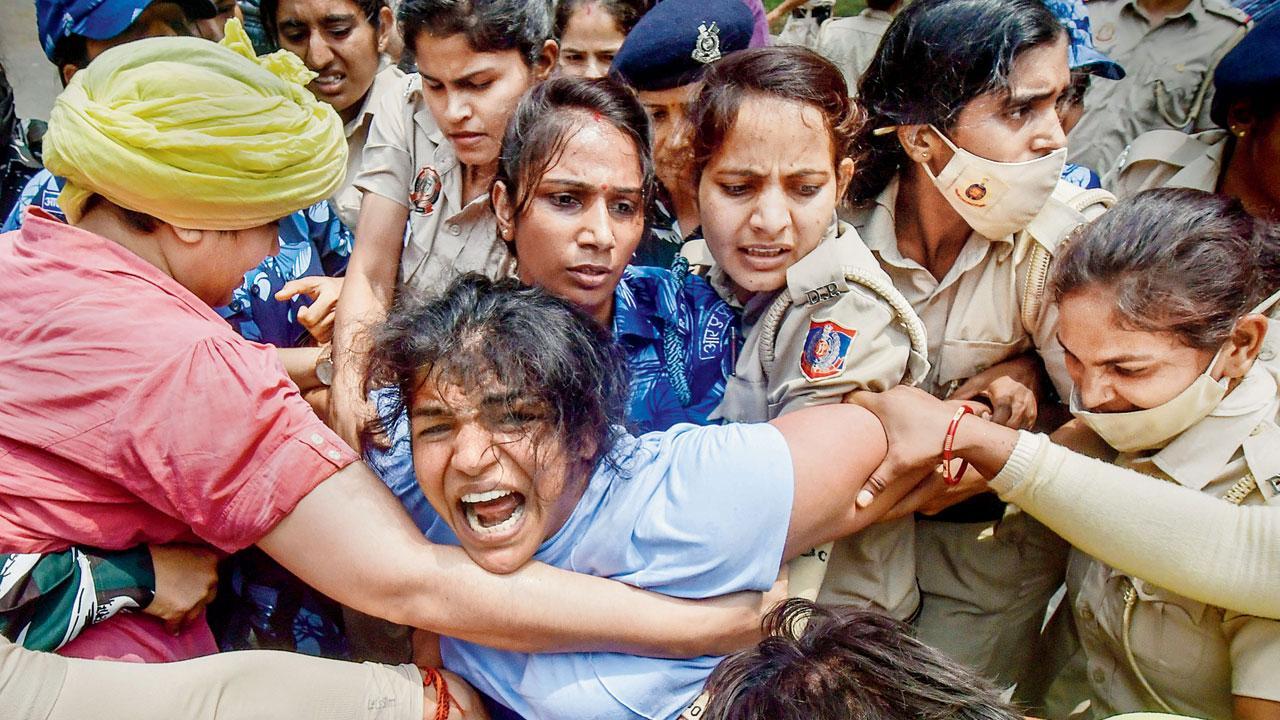Why complaining is courageous
Updated On: 02 June, 2023 08:05 AM IST | Mumbai | Rosalyn D`mello
The decision to formally lodge a complaint implies that you acknowledge that an injustice has taken place and that you were wronged in some way and are seeking redressal

To be treated like a criminal when one is, in fact, seeking justice feels unforgivable. Security personnel detain grappler Sakshi Malik during the wrestlers’ protest march towards the new Parliament building, in New Delhi, on May 28. Pic/PTI
 Some weeks ago, I dedicated my entire class at the University to the subject of complaint in instances of sexual harassment. What does it mean to make a complaint, I asked my students. The decision to formally lodge one implies that you acknowledge that an injustice has taken place, that you were wronged in some way and are seeking redressal. To complain is to demand accountability, from a person or an institution, or sometimes from both. You are moving the forces that be to get into action and begin their investigation so that there may be scope for repair and moving on. I referenced a lecture by Sara Ahmed, who recently released a book based on her research into the subject. Her lecture Complaint as Feminist Pedagogy was presented on May 31 in Bilbao. She begins with an anecdote about a postgraduate student who had begun the process of complaining by communicating to the chair of her department her ‘intent to complain’. She was met with resistance and told to be cautious and think about her career. But it was articulated as a form of concern. She already began to perceive the threat of being treated differently. She tells Ahmed about another student who had become an outcast after filing a complaint. ‘If a story can be inherited as distance (‘no one goes near her’), a complaint gives you proximity, an unwilled proximity, to those who have been cast out,’ Ahmed observes. ‘To make a complaint can be how we acquire scepticism towards stories told about complainers, stories that are rarely told from the complainer’s point of view.’
Some weeks ago, I dedicated my entire class at the University to the subject of complaint in instances of sexual harassment. What does it mean to make a complaint, I asked my students. The decision to formally lodge one implies that you acknowledge that an injustice has taken place, that you were wronged in some way and are seeking redressal. To complain is to demand accountability, from a person or an institution, or sometimes from both. You are moving the forces that be to get into action and begin their investigation so that there may be scope for repair and moving on. I referenced a lecture by Sara Ahmed, who recently released a book based on her research into the subject. Her lecture Complaint as Feminist Pedagogy was presented on May 31 in Bilbao. She begins with an anecdote about a postgraduate student who had begun the process of complaining by communicating to the chair of her department her ‘intent to complain’. She was met with resistance and told to be cautious and think about her career. But it was articulated as a form of concern. She already began to perceive the threat of being treated differently. She tells Ahmed about another student who had become an outcast after filing a complaint. ‘If a story can be inherited as distance (‘no one goes near her’), a complaint gives you proximity, an unwilled proximity, to those who have been cast out,’ Ahmed observes. ‘To make a complaint can be how we acquire scepticism towards stories told about complainers, stories that are rarely told from the complainer’s point of view.’
My students began the class feeling sure they were not people who had anything about which to complain. They had lived lives of relative privilege. But because the earlier class had dealt with consent, with what it means to have been put in a position in which your affirmation is not actively sought out, or when your body is made to feel violated, they had begun to reconsider certain lived experiences of gender-based discrimination and harassment. This was a breakthrough. But it was difficult to move forward, because we then needed to talk about all that we come up against when we decide to formalise a complaint. It takes courage to initiate proceedings, but it takes so much mental energy to keep pushing against walls to have your complaint heard, for it to be met with empathy and for any change to happen consequently. It takes a toll on one’s mental and physical health. Many of us experienced this first-hand during the #MeToo movement. I felt so burned out by the system. I felt so betrayed by people I thought would be in my corner. I was turned into an outcast within the worlds in which I operated. On the literary scene, I was no longer invited to participate in events where my book could have sold or where I would have had a platform. On the arts scene, the people I had previously collaborated with couldn’t anymore look me in the eye. One of the reasons I was able to be so resilient about moving to Italy during the pandemic and setting up my new life here was because there is little left for me back home. Professionally. I had been edged out. All the spaces I thought were possibly communal couldn’t accommodate someone like me, a complainer.



